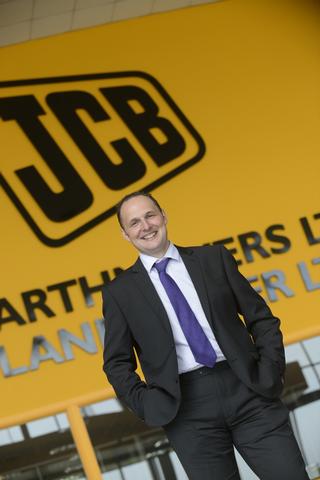Richard Nankervis

Q&A
Five minutes with… JCB project manager, Richard Nankervis
Richard, from Staffordshire, studied BEng (Hons) Agricultural Engineering at Harper Adams. He has worked for JCB for ten years in both the Loadall and Earthmovers divisions.
Why did you choose to study at Harper Adams?
Having performed poorly at A-Levels only achieving one grade, I then worked for a small Agricultural Engineering firm (Teagle Farm Machinery) in Cornwall as an apprentice undertaking one day of college training a week. Whilst there I met a Harper Adams undergraduate on placement who told me about the university.
I began studying on the HND (Now foundation degree)and transferred to the full BEng degree after a six-month review, having proved my ability. I graduated with first class honours.
What were the best things about the course?
The open learning environment with small class sizes ensured you always felt able to question and fully understand the course content. The tutors were excellent with the course content both interesting and relevant. The friends I made both on the course and at Harper Adams in general have remained so some 10+ years on.
Did the course make you more employable?
The industry recognises Harper Adams as a centre of excellence for developing all round engineers. There are so many universities with specialist courses that limit graduate potential when entering the diverse working environment of either off highway or agricultural engineering. The course also develops a practical understanding of real world problems and does not solely focus on theoretical teaching.
Where did you work during your placement?
Benfords Ltd (now Part of the Terex Group), as a design/development engineer. It involved the participation, supervision and management of testing the company’s range of dump trucks and pedestrian roller trailers at the MIRA test institute. We designed test rigs to signoff braking systems, provided design maintenance support, and worked on VAVE (Value Added Value Engineering) and cost reduction initiatives.
What was the best thing about placement?
The ability to learn in a real world environment and to develop personal employment skills in preparation for graduation. I gained a lot of confidence during my placement that helped develop my communication, planning and management abilities.
Do you think placement enhanced your career prospects?
Yes – I know that following my placement I felt ready for a career position after graduation. It prepared me with the tools required to be effective at interviews and also gave a grounding confidence for my first career posting.
What was your first job after graduating?
My first job was as a Design Engineer with Belle Engineering for 18 months, working on designs for the Skid Steer Loader range. I worked on engine installations for a new model and supported other projects such as local homologation of machines within Italy. Other tasks included general fabrication design, hydraulic component specification, customer and supplier liaison, bill of material preparation and liaison with the Assembly and Warranty departments.
And where has your career taken you since?
In 2003 I started my career at JCB, in the Loadall division, and for the next seven years undertook Design and Senior Design Engineer roles. I worked on the company’s range of Loadall products (Construction and Agricultural). Initially I was working within the current product team to familiarise myself, where tasks included updates to the product design in addressing assembly/quality/warranty concerns fed into the dept. Following this I worked on both interior and exterior plastic moulding designs and legislative lighting positions. However the largest part of my career at this division was spent working on engine installations, as the company launched its own range of diesel engines. During this period I acted as the divisional ambassador to help develop the next range of JCB Dieselmax engines in ensuring the machines constraints were considered during the fundamental designs.
In 2010 I moved to JCB Earthmovers. Initially as a Project Engineer my role was to support the Engineering Manager in preparation for machine launches. This ranged from planning, project cost control, BOM (Bill of Materials) management and resolution and management of project issues.
Promoted to Project Manager I now have full responsibility for the divisional launch of all new or upgrade products. I manage the NPIP (New Product Introduction Process) Gate process that ensures full control of project planning, machine development, machine validation through to pre-production and production launch. I regularly present project reviews to the senior executives of JCB and am responsible for multi-million pound projects working in parallel. It is an exciting time for this business unit with huge growth potential.
What do you enjoy most about your job?
The ability to see projects from concept through to production. Although I work with the engineering managers in delivering the new products, I get involved in a wide range of activities and still use my engineering knowledge to guide and manage the projects.
How did your qualification/ experiences at Harper Adams aid your career?
The engineering foundation and knowledge I learnt has put me in good stead throughout my career. During the first five years post-graduation I used the fundamental engineering skills, however I now more readily rely upon the project and people management tools.
What is your opinion of the teaching at Harper Adams?
Second to none. The focus and time spent working with the small class sizes in ensuring full comprehension of the subject matter would be unmatched in a private teaching environment. I firmly believe this ‘luxury’ level of tuition is what produces some of the best engineers in the industry.
Would you recommend Harper Adams?
It has one of the best learning environments anyone could ask for supported by dedicated teaching staff. The students whom attend all seem to get on so well and it’s a great place to learn whilst having fun and growing up!




